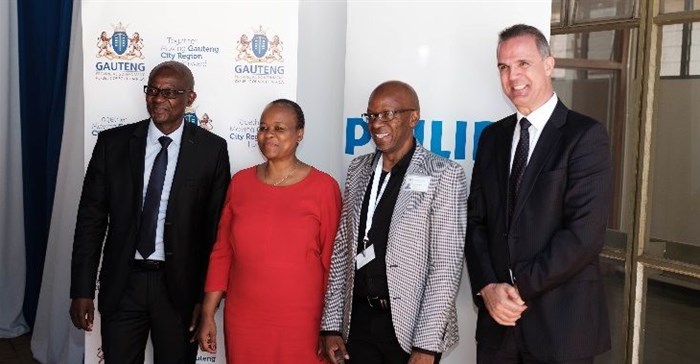An advanced oncology facility, costing R36m, has opened at the Dr George Mukhari Academic Hospital (GDMAH) in Ga-Rankuwa, Tshwane, in an effort to improve service delivery and fast track the diagnosis of patients suffering from cancer in the public sector.

Ntutule Tshenye, GM - Philips South Africa; Gauteng MEC for Health, Dr Gwen Ramokgopa; Dr Freddy Kgongwana, CEO of Dr George Mukhari Academic Hospital (DGMAH); and Jose Fernandes, Head Philips Healthcare, South Africa
“I cannot contain my excitement with the launch of this much-needed biomedical equipment because to us patient care and safety will always come first and today’s launch of the first of its kind PET-CT imaging system in Africa serves as a testimony of our unreserved commitment to improve patient care and the realisation of the Gauteng government’s agenda of transformation, modernisation and re-industrialisation”, said Dr Gwen Ramokgopa, Gauteng health MEC.
“The GDMAH serves a 1.7-million population catchment area, which includes the Bojanala District in the North West Province and Limpopo Province. Therefore, I am optimistic that today’s launch will mark the beginning of an end of suffering to the majority of our cancer patients who used to be referred to Steve Biko Academic Hospital (SBAH) for appropriate PET-CT Scan diagnostics prior to specific treatment for their type of malignancy. This was less than ideal because the overloading of SBAH resulted in tremendously long queue delays which impacted negatively on effective patient management,” she added.
Equipment
The facility includes an advanced Philips Ingenuity TF PET/CT - a nuclear imaging technique that combines position on emission tomography (PET) and computed tomography (CT) to evaluate the structure and function of cells and body tissue. This advanced PET-CT solution ultimately offers a variety of patient-specific methods and tools to facilitate optimal management of both image quality and radiation dose – allowing practitioners to truly focus on each patient’s specific needs.
“The system was installed in June 2017, and has already helped guide decision-making for early diagnosis and assessment of treatment efficacy for over 140 patients,” says Professor Trevor Mdaka, head of nuclear medicine at the department.
"Understandably, many patients referred for PET suffer from anxiety that has been found to affect the image quality and often result in a false positive, which impacts the diagnosis and quality of care. To address this challenge, the new solution transforms the experience by customising both the uptake and scanning room to create a comfortable and calming environment for patients by using technology as a positive distraction when needed most.
"The immersive, multi-sensorial experience, can lead to greater involvement from patients in their own therapy, reduced anxiety and increased comfort, contribute to higher patient satisfaction, and even a possible reduction in procedure time."



































